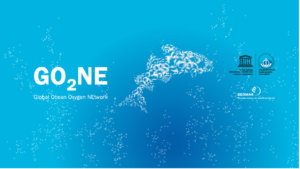Written by Martine Røysted Solås // 5 March 2023
On the 1st of June 2022 we followed the UN Ocean Decade lab webinar:
“The science we need for the healthy fjords we want: Challenges and opportunities for sustainable management of productive fjord ecosystems”.

This webinar was a contribution to 1 of the 7 Ocean Decade outcomes: “A productive ocean where global food supply, source of livelihood and societal needs are sustainably managed.”
Fjords are productive ecosystems that contain a high biomass of organisms. However, many fjords are also sensitive to stagnation due to their shallow sills. Furthermore, there are things that can influence the productivity of our fjord systems: aquaculture, climate change (including deoxygenation), constraints through marine spatial planning and the growing agenda for sustainable development.
The convener of this lab was our post doc, Natalya Gallo. During this two-hour webinar we were led on a scientific tour to different fjord ecosystems; from the British Columbia fjords, to Patagonian fjords, to the Arctic, Faroes Islands and ending with Norwegian and Swedish fjords. We also had the of pleasure listening to different stake holders, including representatives from aquaculture, policy making and other important voices. They gave us their views on the science-policy interface of fjord regions and their opinions on the current opportunities, challenges and knowledge gaps.
Many excellent points were made during this webinar, and for those that are interested, you can watch a recording of the webinar.
One point that was raised repeatedly was the need for cooperation. It was mentioned that as natural scientists we need to reflect on whether we are asking the right questions. It is not difficult to come up with exciting research questions – but are they the most relevant? As scientists, we should make sure that we work together with stake holders and other research disciplines to generate relevant questions so that we can produce relevant knowledge for the time that is now and the future.
Want to know more?

